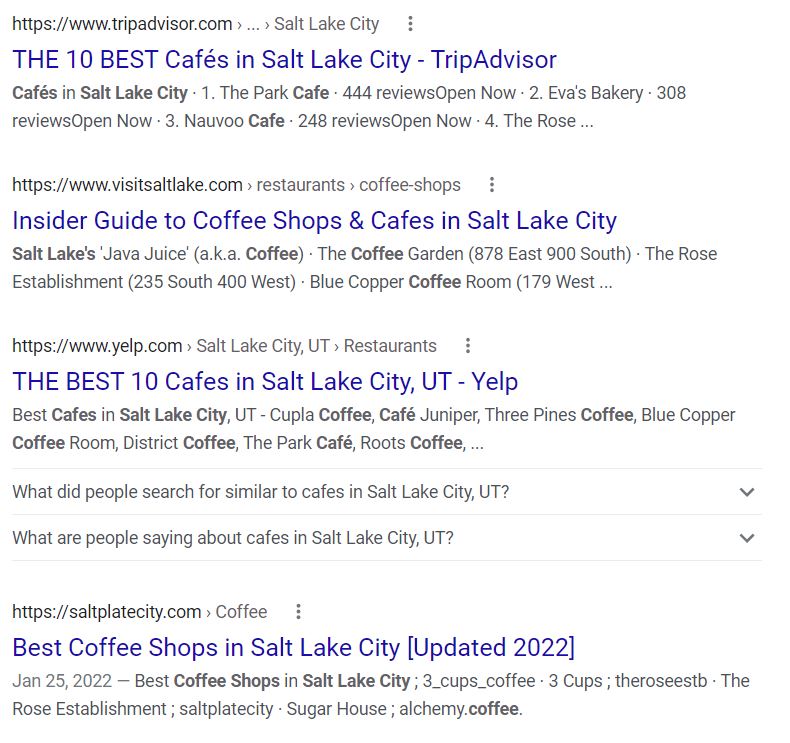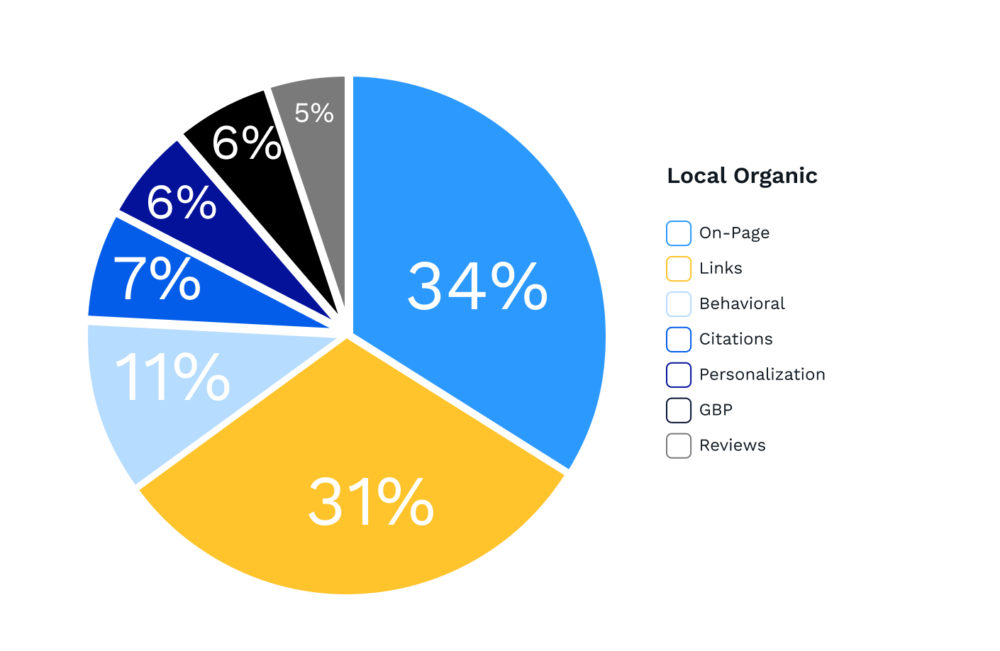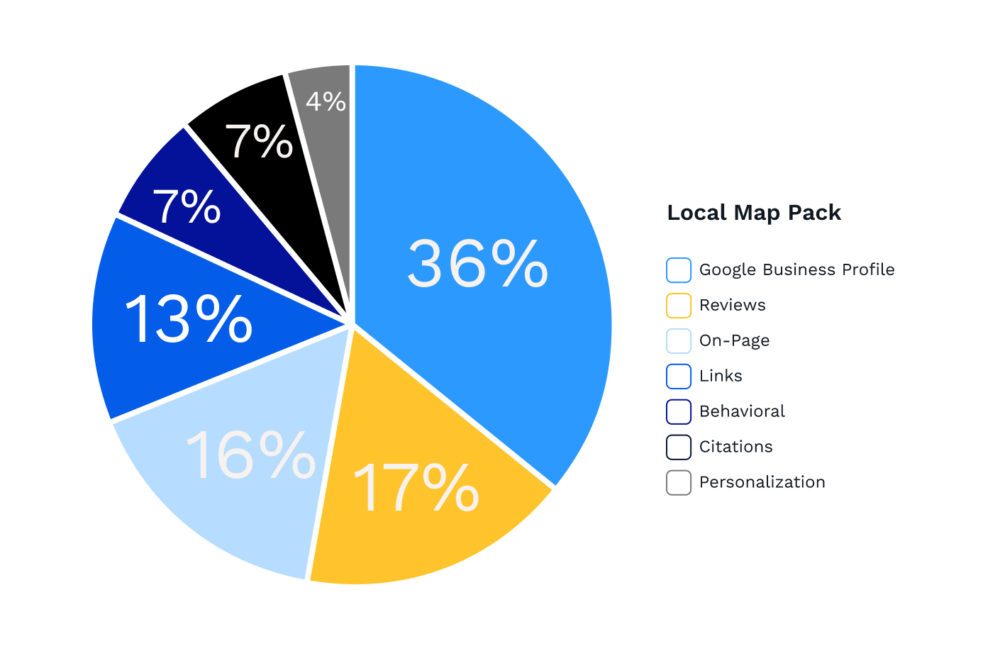
This article was first published on October 5th, 2021, and was last updated June 2022.
Many local search ranking factors that can affect how well you show up online in your local community and Google is continually making updates to the algorithm (and they’ll continue to do so for the foreseeable future). Some factors move up or down in importance or insignificance, so knowing why something helps your rankings is great. However, it helps even more to know which ones really matter and which don’t.
However, when you try to look up any information about ranking factors for local pages, or how to rank your website for a local audience, you will be bombarded with confusing and sometimes conflicting information. Today, you will gain a better understanding of the 5 common local search ranking factors you need to be prioritizing for both the Local Map Pack and Local Organic to increase your SERP (search engine results page) positioning. Let’s get started!
Table of Contents:
- Difference Between Local Organic vs Local Map Pack Results
- 5 Most Important Local SEO Ranking Factors for the Local Organic Results
- 5 Most Important Local Pack Ranking Factors
What’s the Difference Between Local Organic Results and Local Map Packs?
These two types of results are treated differently because some ranking factors are valued and weighed differently between the two. The Local Map Pack also has ranking factors that apply to it that do not with the Local Organic results.
Local Organic Results
Local organic results display in the same manner as traditional SEO (or national SEO) results would—it’s typically 10 listings that show up underneath the Google Ads at the top of the page. See the image below for an example:

Local Map Pack
Also referred to as the Local Pack, the Local Map Pack generally shows up at the top or to the right of the local organic results in the SERP and consists of Google Business Profiles instead of general webpages as displayed in the Local Organic Results. There are also different local pack ranking factors that need to be optimized for that do not necessarily apply to traditional organic SERP listings (see what those are below).

What Are the 5 Most Important Local SEO Ranking Factors for the Local Organic Results?

1. On-Page Signals
On-page signals are incredibly important for both traditional and local SEO. They have been consistently important for rankings since 2013, and especially so for the local organic results. Individual on-page optimization factors include a variety of different elements including:
- Keywords in titles
- NAP (name, address, and phone number) data
- Domain authority
- Optimized content
On-page optimization is always going to be essential, so it’s wise to understand on-page signals for your website. Content is king when it comes to search ranking factors. And the key to effective local search strategies is having relevant keywords and keyword phrases while focusing your content locally.
Keywords
Search engines use web crawlers to analyze websites and understand what they are about. These crawlers look for keywords in your content to determine which specific searches your website ranks for and what matches the user’s intent.
If you’re trying to rank for a specific keyword or phrases, you need to conduct keyword research to know which keywords are best to add to the page you want to rank. Just make sure to use long-tail keywords that your potential client might use to search for your products or services by doing local keyword research. For example, “Plumbing Services in Lehi”, UT is a great long-tail keyword for a plumbing company in Utah.
If possible, also use the keywords in page titles, headings, meta titles and descriptions, anchor texts, URLs, and image alt text. It’s important to also incorporate similar (semantic) phrases and variations to enhance the connection.
NAP (Name, Address, and Phone Number)
The biggest factors to consider with your NAP are consistency and accuracy. Being consistent and accurate on your website, business listings, and outreach is extremely important. It helps build credibility for your website and helps customers and search engines trust your information.
Domain Authority
Having a strong domain authority helps strengthen your on-page website factors. The better the domain authority, the more trustworthy your website is to search engines. It helps add value to the links you create and share with other websites. For local search rankings, building your domain authority helps your website rank higher.
Optimized Content
Building high-quality content and optimizing existing content is one of the best ways to meet the standard for local search ranking factors. Through blogging, use of local keywords, and engaging readers who are looking for services or products in your area, you can rank higher in the search results.
2. Link Building
Link signals have long been known to be very valuable for boosting organic search rankings. With 57% of Google users saying local information is the most important information when looking for a business online, it’s no surprise that this data point is so widely researched. The second best way to rank highly for local organic search is to have quality links coming from relevant websites. Individual link factors include inbound anchor text, linking domain authority, and linking domain quantity.
There have been many developments in the Google algorithm over the last several years. One of these improvements is a clear focus on quality backlinks. If your SEO efforts include a clean link building strategy, you’ll be able to power your website to a top spot in organic searches with minimal effort.
However, you need to understand that only links from authoritative sites in your niche will tend to count toward the keywords you’re targeting, while shady-looking links affect your local search ranking. This isn’t necessarily good news for website owners, but it’s something that should be taken into account while you build your authority by earning links.
If you’re not sure about the quality of your backlinks, the MozBar Chrome extension is a great tool to gauge the strength of your backlinks according to what Google values most. So, when you’re analyzing a web page, you can see how well it utilizes the major search engine ranking factors (authority, trust, relevance, etc.).
3. Behavioral Signals
Behavioral signals have everything to do with customers’ interactions and behaviors with your website. Individual behavioral ranking factors include elements, such as click-through rate, mobile clicks to call, and dwell time. For local organic search ranking, it’s important for your business website to be marketable and set up to attract customers when your rankings are high. When you do so, it helps search engines keep your ranking high over time.
Behavioral signals are a reliable source of information for Google because this type of data can’t be fabricated. The data comes from actions that are taken by the searcher, and therefore, can only be influenced to a certain degree. Instead of trying to manipulate user behavior, spend time optimizing your GBP profile to give the user the best experience. This involves creating optimized copy for titles, meta descriptions, posts, and more. Make your listing as valuable and cohesive as possible, and you’ll move closer to winning at rankings and conversions.
It’s important to remember that the end goal of SEO isn’t just to improve rankings alone. The focus must also be to attract the right customers to a business to also generate revenue. When you start getting seen by the customers who are interested in you, they will naturally enhance the behavioral signals towards your site. Which as a result, helps your local organic SEO rankings.
4. Citations
Citations include off-page factors, such as adding your information to directories and listings, being consistent with your information, the number of citations you have, etc. While they may have decreased, citations are still valuable for visibility and building trust with customers and search engines. When a potential customer can observe that a business’s information is correct and consistent across the web, then this helps to establish credibility.
There are two types of citations your business can create: unstructured and structured. An unstructured citation is when your information is not matching, missing, or incorrect with your business information. When you have inconsistent information in multiple areas, search engines won’t find your business information as credible or consistent for its users. A structured citation is where you add your business information to business listings and directories that are credible. This is a great and easy opportunity for you to gain reliable backlinks. The more you’re able to join these trustworthy sources, the more credible your local organic SEO rankings become.
5. Personalization
The fifth top organic local search ranking factor is individual personalization including search history, search location, and device. It all factors around how you’re more likely to see results from websites that you’re already familiar with or have visited frequently. Location can also have a hand in user searches and by the language they use.
Personalization can have an impact on general search results, but is less likely to impact localized search results. For personalization considerations, there isn’t much you can do from an SEO perspective to optimize your website. However, if your business serves in countries with different languages, you can accommodate this by having your resources available in their native language. Multilingual SEO is a largely underutilized resource that local businesses can tap into where appropriate. Overall, you can rank with localized organic SEO factors when you customize to all of your audiences.
What Are the 5 Most Important Local Pack Ranking Factors?

1. Google Business Profile
Google Business Profile, formerly known as Google My Business, is the golden goose of local SEO. The impact and value of GBP as a Local Pack ranking factor has increased since 2018. As a business owner, you may have heard about GBP and that it’s a free SEO tool that allows business owners to upload details about their companies, products, and services, to better compete with their rivals.
Since a GBP listing is one of the first things clients will come across when searching for products and services on Google it is important to set it upright, especially for Local Map Packs. Search algorithms use GBP signals like contact info, proximity, updated content, and categories to understand where you and your business are to show it to people in your area.
To make a good Google Business Profile listing you should :
- Verify your business. Google will rank your listing higher if it has a physical address and consistent hours.
- Claim your listing. Google will count your listing as a current business if it has a confirmed address and phone number.
- Add location information. Google wants to know where your business is located to recommend services locally.
- Add categories. Categories let Google categorize your listing and make it easier for people to find you.
- Select photos. Images are important, so it’s best to include several photos.
If your listing isn’t listed on Google Business Profile, you’re missing out on a lot of business. Make sure you’ve filled out all of the relevant sections on your profile and that you continue to add photos and make new posts over time to continue to rank in the Local Map Pack.
If you’re new to this or need a refresher, take a look at our in-depth article on how to create and manage your Google Business Profile (Google My Business) listing here!
2. Reviews
Reviews are an extremely important part of your ranking strategy. This is why they are the second most important Local Pack ranking factor. Reviews help build trust not only with your customers, but also with search engines. Individual review signal factors include first- and third-party reviews, review quantity, review velocity, and review diversity. Having a higher overall Google rating from reviews helps drive more conversions in GBP. And while it’s important to have more positive than negative reviews, having a mix of both actually presents your business as more credible. Overall, to appear more in local map packs, go over your review management to be the best it can be.
3. On-Page Signals
Just like with local organic results, on-page signals are very important to local map rankings as well. Optimizing your site is extremely important in all that you do and especially in ranking factors. Be sure to go over on-page signals, such as keyword research, optimized content, and NAP consistency to meet the standards for Local Pack ranking factors.
4. Authoritative Backlinks
Building links is also an important factor for local map pack rankings. The authority of inbound links to a website is an important factor affecting Local Pack results. While earning quality backlinks can be a difficult and time-consuming task, they go a long way to improving the authority of a site, and are a worthwhile investment of your resources. Learn more details about link building.
5. Behavioral Signals
As mentioned earlier, behavioral signals can consist of click-through rate, mobile clicks to call, and dwell time. The best way to optimize for behavioral signals is to create the best possible user experience. Give people information they need immediately rather than expecting them to hunt around for it—consumers want instant gratification, not delayed.
Do this by optimizing your Google Business Profiles with as much detail as possible. If you are a restaurant owner or are managing a restaurant’s website, connect your GBP profile to your menu and reservation links immediately so people can fill this out directly from the GBP listing. There are so many integration capabilities now that businesses can take advantage of—for example, connect your GBP listing to OpenTable.
User experience also accounts for page speed optimization. Your website needs to load quickly and it must be responsive for all devices. Work with your web developer to make your site responsive if it isn’t already. The mobile version of your website is crawled by search engines first before the desktop version. So, all elements need to be functioning properly.
Boost Your Online Presence Today
Businesses that don’t rank well in local searches run the risk of losing potential customers and eventually going out of business. The need for well-crafted local SEO strategies is more important than ever and your agency can be the solution for many businesses in your very own community!
At Boostability, we are a full-service white label SEO company focused on businesses looking to help their customers gain local visibility online. Our white label local SEO services are data-driven and proven to help businesses be seen as trustworthy and authoritative to help increase their local search rankings. We can help your agency by acting as an extension of your team while working behind-the-scenes. Learn more today about growing online with our partner program!
